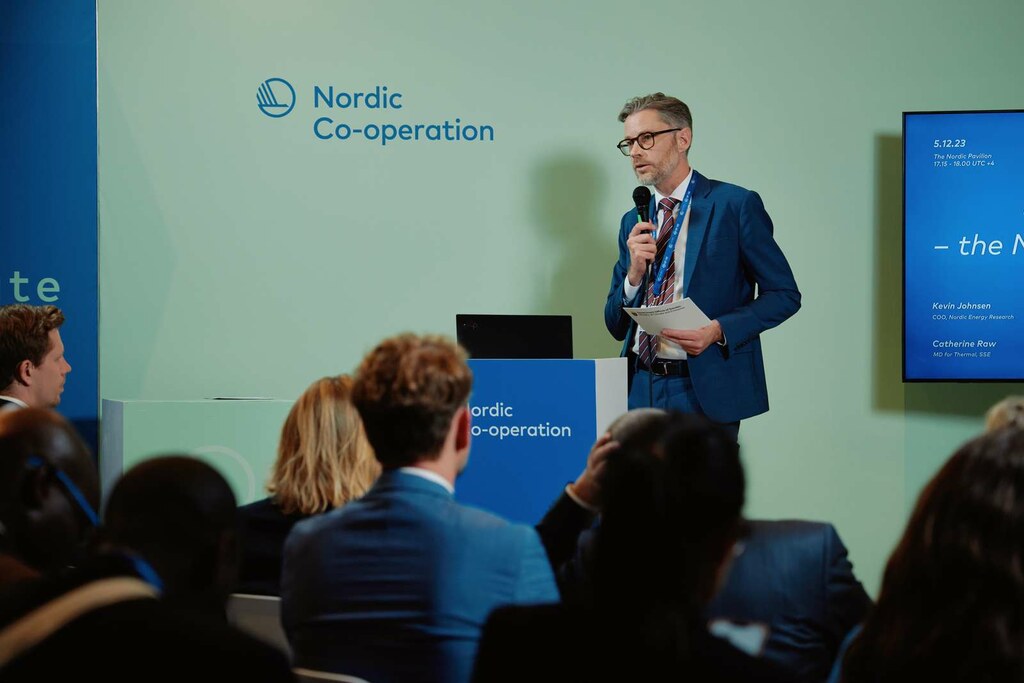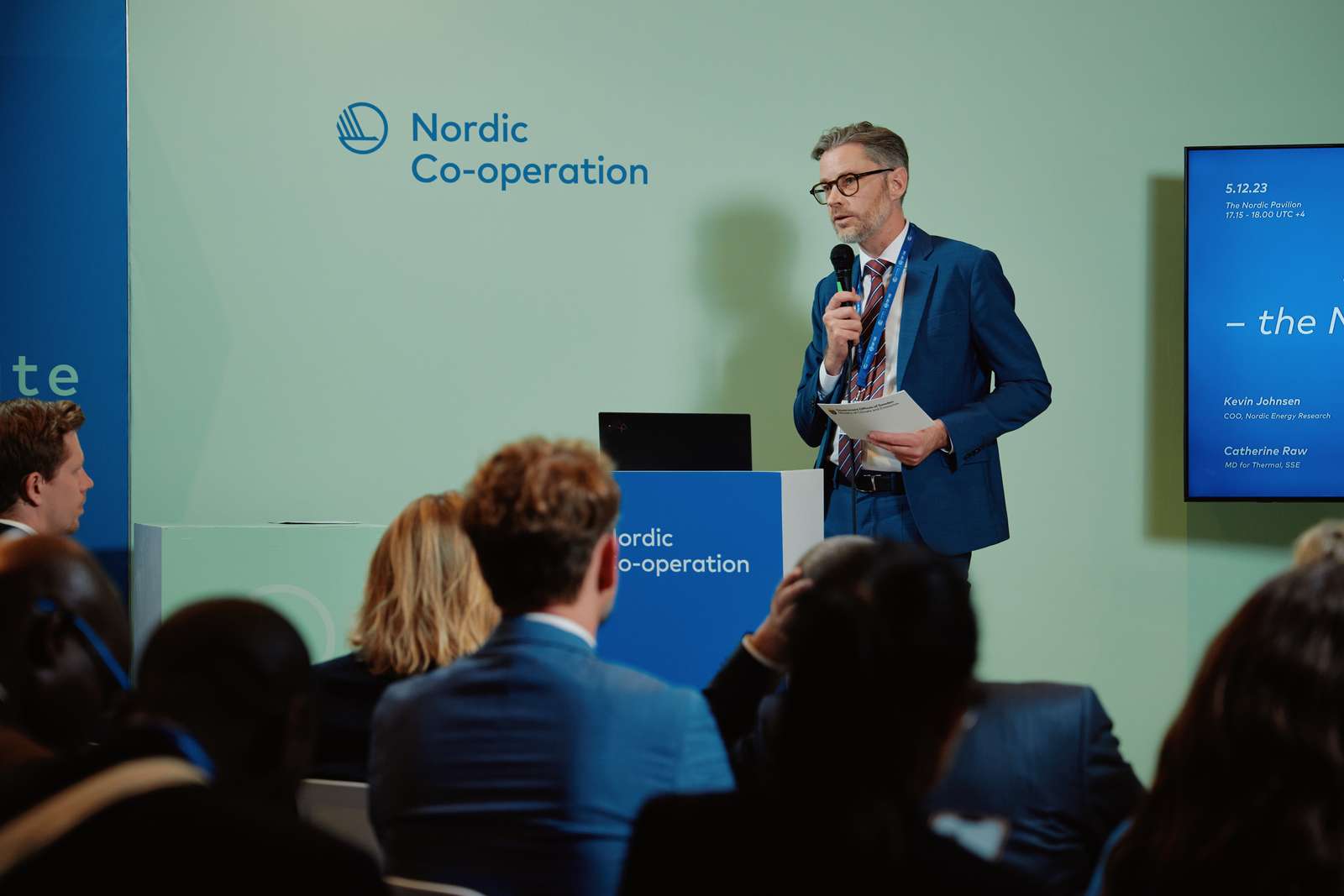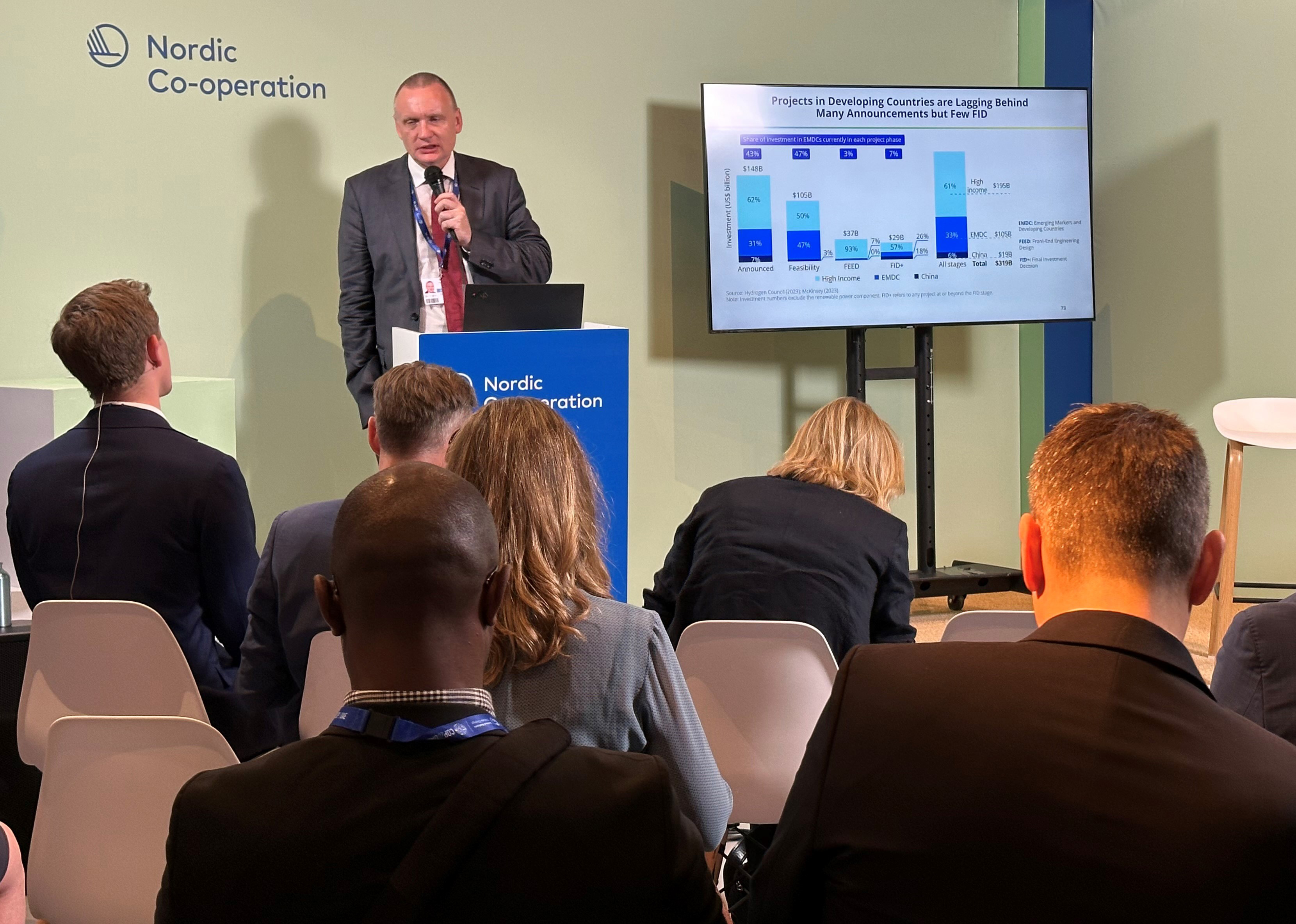
Nordic cooperation on hydrogen can be bigger and bolder
Hydrogen plays an increasingly important role in the transition of the hard-to-abide sectors, and the Nordic Energy Ministers, in their joint declaration in October, pointed out a particular good potential…
Hydrogen plays an increasingly important role in the transition of the hard-to-abide sectors, and the Nordic Energy Ministers, in their joint declaration in October, pointed out a particular good potential in Nordic cooperation on hydrogen. Against this backdrop, Nordic Energy Research invited experts from companies, organisations, government agencies, and politics to a session at COP28 to give their perspective on how the deployment of hydrogen can increase in the Nordic region.
Speaking at the event were Daniel Westlén, State Secretary to the Swedish Minister for Climate and the Environment; Dolf Gielen, Senior Energy Economist and Hydrogen Lead, The World Bank; Catherine Raw, Managing Director, SSE Thermal; Ada Martine Jakobsen, CEO, NCE Maritime CleanTech; Rikke Wetter Olufsen, Deputy Director General, Danish Maritime Authority. The moderator was Kevin Johnsen, COO, Nordic Energy Research.
Sweden sees a massive demand for clean hydrogen
The Swedish industry’s demand for clean hydrogen is massive, as Daniel Westlén, State Secretary to the Swedish Minister for Climate and the Environment, put it. “Hydrogen is an indirect electrification because most of the hydrogen we see that we need will have to come from electrolysis.”

Daniel Westlén, State Secretary to the Swedish Minister for Climate and the Environment.
On the growing demand for hydrogen from the steel industry, Westlén said that LKAB alone will consume hydrogen worth 50 percent of the current Swedish electricity production, but that’s not all; Sweden also needs to produce fossil-free fertilizer as well as electrofuels for parts of the transport sector that can’t be electrified.
“The three sources of energy that we can expand on a massive scale – so massive that we can actually replace fossil fuels on a global scale while fighting poverty and increasing access to energy for people around the globe – are three. That would be solar, that would be wind, and it would be nuclear.”
Financing the scaling of hydrogen
One of the challenges to scaling up the use of hydrogen is financing. Dolf Gielen, Senior Energy Economist and Hydrogen Lead at the World Bank, gave an introduction to the work the World Bank has done together with partners on scaling hydrogen financing.

Scandinavian best practice inspires
“We see a very important role for the exchange of international best practices. Scandinavian best practice is, of course, very important in that context,” Gielen said before continuing with an explanation of how we can learn from Scandinavian best practice.
- Ambitious and credible decarbonization objectives (and a close partnership between the public and private sectors)
- High shares of renewable power enable the rapid introduction of renewable hydrogen
- Hubs and cluster approaches (e.g. Norrbotten)
- Regional cooperation, e.g. to implement hydrogen infrastructure
- Attention to local value creation and socioeconomic benefits
- Significant local value added through supply industries or downstream integration
“I want to see bigger and bolder”

Panel: Ada Martine Jakobsen, CEO, NCE Maritime CleanTech, Catherine Raw, Managing Director, SSE Thermal and Rikke Wetter Olufsen, Deputy Director General, Danish Maritime Authority.
Catherine Raw, Managing Director at SSE Thermal, Ada Martine Jakobsen, CEO of NCE Maritime CleanTech, and Rikke Wetter Olufsen, Deputy Director General at the Danish Maritime Authority, highlighted some of the important work on hydrogen in the Nordics as well as in the UK. They painted a complex but optimistic picture of the development of hydrogen, and all agreed on the importance of collaboration in the field.
“It’s important to share experiences and to learn from all our colleagues, both Nordic and from other countries, that are ahead of us. Good dialogue is the only way for us to find a common way — dialogue and knowledge sharing,” says Wetter Olufsen.
“I’m positive about what I’ve seen, but I do think that we need Nordic cooperation on top of national policies. I want to see bigger and bolder — you want very high precision, but you also need feedback loops of learning in order to move forward,” according to Jakobsen.
When it comes to cooperation, Raw also specified that there needs to be more collaboration on standardisation and definitions.
“To scale up hydrogen fast, we need to make sure that we’re in line with Europe and eventually globally, so that you don’t create barriers as to what is defined as low-carbon hydrogen in order to sell and market it. It is happening, but not fast enough,” she says.
Nordic Energy Research’s work on hydrogen
- Nordic Hydrogen Valleys as Energy Hubs Programme
- Heavy duty land-based transport on biomethane from local biogas and green hydrogen
- Mapping Nordic Hydrogen Valleys

